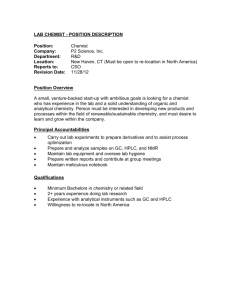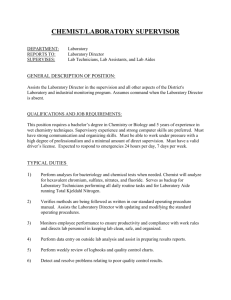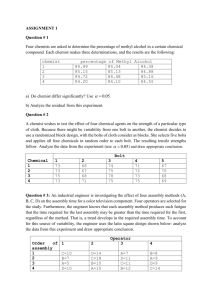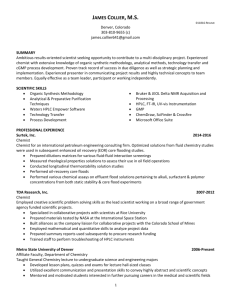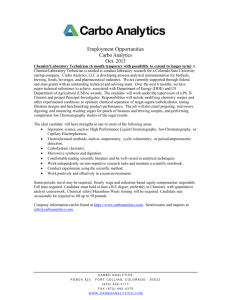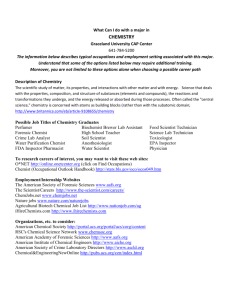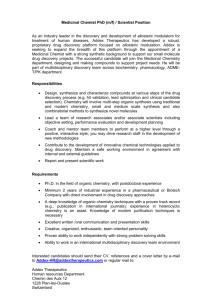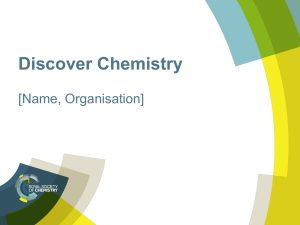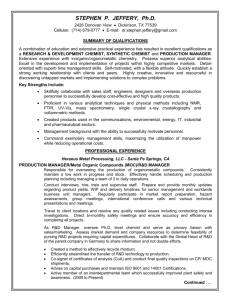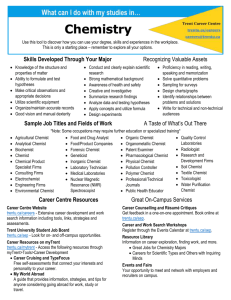Chemist - Massachusetts Department of Higher Education
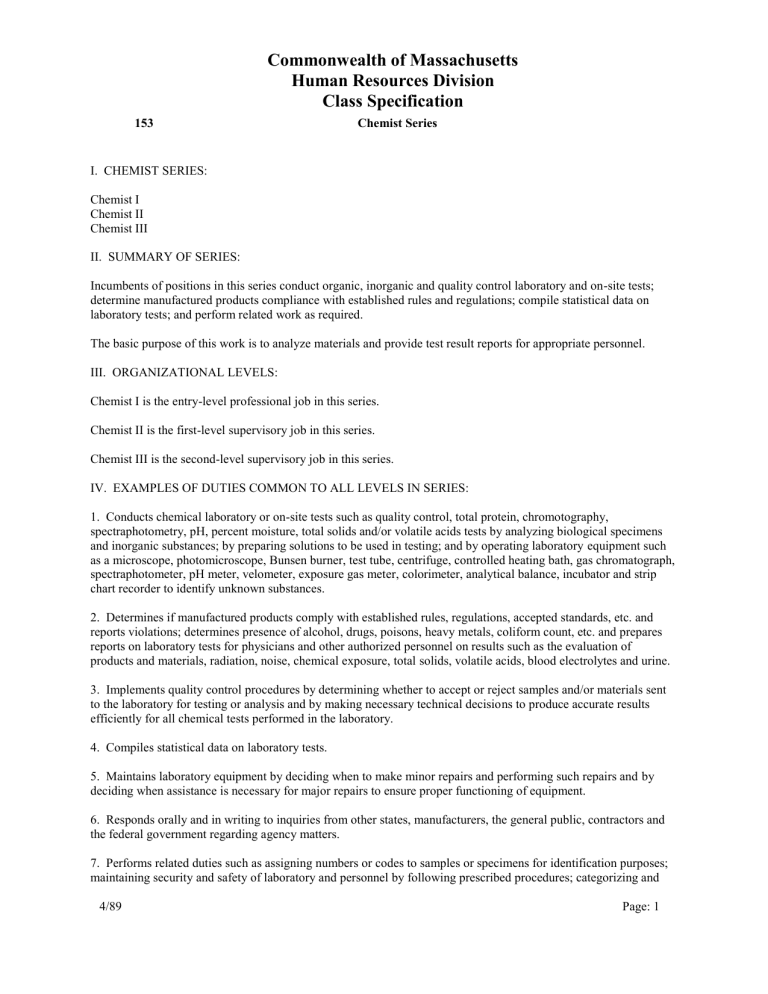
153
Commonwealth of Massachusetts
Human Resources Division
Class Specification
Chemist Series
I. CHEMIST SERIES:
Chemist I
Chemist II
Chemist III
II. SUMMARY OF SERIES:
Incumbents of positions in this series conduct organic, inorganic and quality control laboratory and on-site tests; determine manufactured products compliance with established rules and regulations; compile statistical data on laboratory tests; and perform related work as required.
The basic purpose of this work is to analyze materials and provide test result reports for appropriate personnel.
III. ORGANIZATIONAL LEVELS:
Chemist I is the entry-level professional job in this series.
Chemist II is the first-level supervisory job in this series.
Chemist III is the second-level supervisory job in this series.
IV. EXAMPLES OF DUTIES COMMON TO ALL LEVELS IN SERIES:
1. Conducts chemical laboratory or on-site tests such as quality control, total protein, chromotography, spectraphotometry, pH, percent moisture, total solids and/or volatile acids tests by analyzing biological specimens and inorganic substances; by preparing solutions to be used in testing; and by operating laboratory equipment such as a microscope, photomicroscope, Bunsen burner, test tube, centrifuge, controlled heating bath, gas chromatograph, spectraphotometer, pH meter, velometer, exposure gas meter, colorimeter, analytical balance, incubator and strip chart recorder to identify unknown substances.
2. Determines if manufactured products comply with established rules, regulations, accepted standards, etc. and reports violations; determines presence of alcohol, drugs, poisons, heavy metals, coliform count, etc. and prepares reports on laboratory tests for physicians and other authorized personnel on results such as the evaluation of products and materials, radiation, noise, chemical exposure, total solids, volatile acids, blood electrolytes and urine.
3. Implements quality control procedures by determining whether to accept or reject samples and/or materials sent to the laboratory for testing or analysis and by making necessary technical decisions to produce accurate results efficiently for all chemical tests performed in the laboratory.
4. Compiles statistical data on laboratory tests.
5. Maintains laboratory equipment by deciding when to make minor repairs and performing such repairs and by deciding when assistance is necessary for major repairs to ensure proper functioning of equipment.
6. Responds orally and in writing to inquiries from other states, manufacturers, the general public, contractors and the federal government regarding agency matters.
7. Performs related duties such as assigning numbers or codes to samples or specimens for identification purposes; maintaining security and safety of laboratory and personnel by following prescribed procedures; categorizing and
4/89 Page: 1
Commonwealth of Massachusetts
Human Resources Division
Class Specification
153 Chemist Series filing records, journals, manuals and reference books; reading pertinent published materials to keep abreast of developments in the field; attending public hearings, meetings, seminars, workshops, etc. to solicit information, exchange ideas and/or present agency policy.
Based on assignment, incumbents of positions may also:
1. Determine causes of incidents dealing with environmental health hazards by designing and/or implementing testing programs when it becomes necessary to determine public health hazards from toxic chemicals and/or materials.
2. Provide technical advice by telephone or at crime scenes to police and/or fire personnel on immediate measures to be taken in obtaining and handling physical evidence; and/or confer with investigators regarding facts and suspicions pertaining to cases to determine the types of tests to be performed.
V. DIFFERENCES BETWEEN LEVELS IN SERIES:
Chemist II:
Incumbents of positions at this level or higher also:
1. Testify in court or at formal hearings by appearing as an expert witness to defend the findings of a test examination or analysis.
2. Maintain inventory of laboratory supplies and equipment by determining when such supplies, equipment and chemicals must be ordered, and by writing purchase orders to maintain proper supply levels.
3. Supervise and instruct professional personnel in the proper procedures to be followed in testing, sampling and analyzing materials, liquids and chemicals.
4. Analyze suspected narcotics and other substances to make positive identification for use as evidence in court.
5. Examine physical evidence to determine whether a possible connection exists between suspects, suspect's vehicles and victims at crime scene and participate in pre-trial conferences with district attorneys and investigators.
Chemist III:
Incumbents of positions at this level also:
1. Conduct investigations of industrial establishments by inspecting for over-exposure to radiation and chemicals, air and water quality and noise pollution, determining if health hazard rules and regulations have been met and issuing notices of violation or discrepancy where such are found.
2. Recommend action to be taken to correct violations and determine acceptable health limits of various media where none have been established.
3. Decide what samples need to be taken at industrial sites for proper testing and what priority should be given to the correction of industrial violations.
4. Conduct scientific research; develop new methods of testing and evaluating drugs and materials and recommend alternative measures for working with new materials in order to improve performance.
4/89 Page: 2
Commonwealth of Massachusetts
Human Resources Division
Class Specification
153 Chemist Series
5. Conduct seminars, lectures and demonstrations before civic and professional groups, medical and law enforcement personnel.
6. Meet with manufacturers' representatives to discuss price, availability, specifications and/or standards of equipment and materials.
7. Respond orally and in writing to inquiries from other states, manufacturers, the general public, contractors, and the federal government regarding agency matters.
VI. RELATIONSHIPS WITH OTHERS:
Major work contacts are with agency staff; representatives of various federal, state or municipal agencies; manufacturers; contractors and the public.
VII. SUPERVISION RECEIVED:
Chemist I:
Incumbents of positions at this level receive general supervision from Chemists or other employees of higher grade who provide training and instruction, assign work and review performance through conferences and reports for conformance with applicable policies and procedures.
Chemist II:
Incumbents of positions at this level receive general supervision from Chemists or other employees of higher grade who provide guidance on policy and procedures, assign work and review performance through conferences and reports for conformance with applicable policies and procedures.
Chemist III:
Incumbents of positions at this level receive general supervision from employees of higher grade who provide policy guidance, assign work and review performance through conferences and reports for conformance with applicable policies and procedures.
VIII. SUPERVISION EXERCISED:
Chemist I:
Incumbents of positions at this level exercise functional supervision (i.e. over certain but not over all work activities, or over all work activities on a temporary basis) over 1-5 personnel.
Chemist II:
Incumbents of positions at this level exercise direct supervision (i.e not through an intermediate level supervisor) over 1-5 professional and/or technical personnel.
Chemist III:
Incumbents of positions at this level exercise direct supervision (i.e. not through an intermediate level supervisor) over 1-5 professional personnel; and indirect supervision (i.e. through an intermediate-level supervisor) over 6-15 professional and/or technical personnel.
4/89 Page: 3
Commonwealth of Massachusetts
Human Resources Division
Class Specification
153 Chemist Series
IX. WORKING CONDITIONS:
Chemists are exposed to the harmful effects of hazards such as Bunsen burners, toxic fumes and substances, explosives and flammable substances; exposure to communicable diseases and to noxious and disagreeable odors such as human waste, chemicals, decomposed bodies; lift supplies or equipment which weigh up to fifty (50) pounds and may work varied shifts, weekends, holidays or nights and may travel for job-related purposes.
X. QUALIFICATIONS REQUIRED AT HIRE FOR ALL LEVELS IN SERIES:
1. Knowledge of the terminology and standard abbreviations used in a chemical laboratory.
2. Knowledge of the types and uses of equipment used in a chemical laboratory such as a velometer, spectrophotometer, refractometer, microscope, exposure gas meter, colorimeter, etc.
3. Knowledge of general laboratory techniques and methods, including sample collection.
4. Knowledge of safety practices and procedures followed in a laboratory.
5. Knowledge of the properties and characteristics of various chemicals used in a laboratory.
6. Knowledge of the calibration and adjustment techniques applied to the equipment used in a laboratory.
7. Knowledge of the practices, techniques and tests relative to a chemical laboratory.
8. Knowledge of the principles and practices of general chemistry, analytical chemistry, organic chemistry, inorganic chemistry and physical chemistry.
9. Knowledge of chemistry research methods and procedures.
10. Knowledge of the structure, composition and nature of matter.
11. Knowledge of the principles and correct usage of the English language, including grammar, spelling, sentence structure, word meaning and punctuation.
12. Knowledge of elementary algebra.
13. Knowledge of the theory and practice of chemical analysis using optical and electromechanical instrumentation.
14. Knowledge of the proper methods used in the disposal of contaminated laboratory materials.
15. Knowledge of mathematics used in solving chemistry problems.
16. Knowledge of the techniques for the handling and transportation of samples and specimens used in a laboratory.
17. Knowledge of the sanitation and sterilization methods, techniques and procedures followed in a chemical laboratory.
18. Knowledge of the principles and practices of general physics.
19. Knowledge of the types and uses of sterilization equipment and devices used in a chemical laboratory.
4/89 Page: 4
Commonwealth of Massachusetts
Human Resources Division
Class Specification
153 Chemist Series
20. Ability to analyze and determine the applicability of chemical test data, to draw conclusions and make appropriate recommendations.
21. Ability to gather information through questioning and observing individuals and by examining records and documents.
22. Ability to deal tactfully with others.
23. Ability to assemble items of information according to established procedures.
24. Ability to determine proper format and procedure for assembling items of information.
25. Ability to distinguish colors visually.
26. Ability to collect chemical data.
27. Ability to read and interpret such documents as test results and technical manuals.
28. Ability to follow written and oral instructions.
29. Ability to understand and apply the laws, rules, regulations, policies, procedures, specifications, standards and guidelines governing assigned unit activities.
30. Ability to work independently.
31. Ability to prepare statistical reports.
32. Ability to give oral and written instructions in a precise, understandable manner.
33. Ability to perform mathematical calculations using formulae to solve chemistry problems.
34. Ability to maintain accurate records.
35. Ability to make effective oral presentations.
36. Ability to communicate effectively in writing.
37. Ability to perform arithmetic computations (addition, subtraction, multiplication and division) with speed and accuracy.
38. Ability to lift and carry heavy objects.
39. Manual dexterity.
Based on assignment, the following additional qualification may be required at hire:
1. Ability to operate a motor vehicle.
Additional qualifications required at hire for Chemist II and higher positions:
1. Ability to supervise, including planning and assigning work according to the nature of the job to be
4/89 Page: 5
Commonwealth of Massachusetts
Human Resources Division
Class Specification
153 Chemist Series accomplished, the capabilities of subordinates and available resources; controlling work through periodic reviews and/or evaluations; determining subordinates' training needs and providing or arranging for such training; motivating subordinates to work effectively; determining the need for disciplinary action and either recommending or initiating disciplinary action.
Additional qualifications required at hire for Chemist III positions:
1. Knowledge of the principles, practices and techniques of supervision.
XI. QUALIFICATIONS ACQUIRED ON JOB AT ALL LEVELS IN SERIES:
1. Knowledge of the laws, rules, regulations, policies, procedures, specifications, standards and guidelines governing assigned unit activities.
2. Knowledge of the types and availability of public or private community-based organizations and sources for providing equipment repair and equipment calibration services.
3. Knowledge of the types and uses of agency forms.
Additional qualifications acquired on job in Chemist II positions:
1. Knowledge of the principles, practices and techniques of supervision.
XII. MINIMUM ENTRANCE REQUIREMENTS:
Chemist I:
Applicants must have at least (A) two years of full-time, or equivalent part-time, professional or technical experience in the field of chemistry, or (B) any equivalent combination of the required experience and the substitutions below.
Substitutions:
I. A Bachelor's or higher degree with a major in chemistry or biochemistry may be substituted for the required experience.*
*Education toward such a degree will be prorated on the basis of the proportion of the requirements actually completed.
Chemist II:
Applicants must have at least (A) three years of full-time, or equivalent part-time, professional or technical experience in the field of chemistry, of which (B) at least one year must have been in a professional capacity or (C) any equivalent combination of the required experience and the substitutions below.
Substitutions:
I. A Bachelor's degree with a major in chemistry or biochemistry may be substituted for a maximum of two years of the required (A) experience.*
II. A Graduate degree with a major in chemistry or biochemistry may be substituted for the required experience.*
4/89 Page: 6
Commonwealth of Massachusetts
Human Resources Division
Class Specification
153 Chemist Series
*Education toward such a degree will be prorated on the basis of the proportion of the requirements actually completed.
Chemist III:
Applicants must have at least (A) four years of full-time, or equivalent part-time, professional or technicalexperience in the field of chemistry, of which (B) at least two years must have been in a professional capacity, or (C) any equivalent combination of the required experience and the substitutions below.
Substitutions:
I. A Bachelor' degree with a major in chemistry or biochemistry may be substituted for two years of the required
(A) experience.*
II. A Graduate degree with a major in chemistry or biochemistry may be substituted for three years of the required
(A) experience and one year of the required (B) experience.
*Education toward such a degree will be prorated on the basis of the proportion of the requirements actually completed.
NOTE: Educational substitutions will only be permitted for a maximum of one year of the required (B) experience.
XIII. SPECIAL REQUIREMENTS:
Based on assignment, possession of a current and valid Massachusetts Class 3 Motor Vehicle Operator's license.
Occupational Group 25
Revised 4/89
Page: 7 4/89
